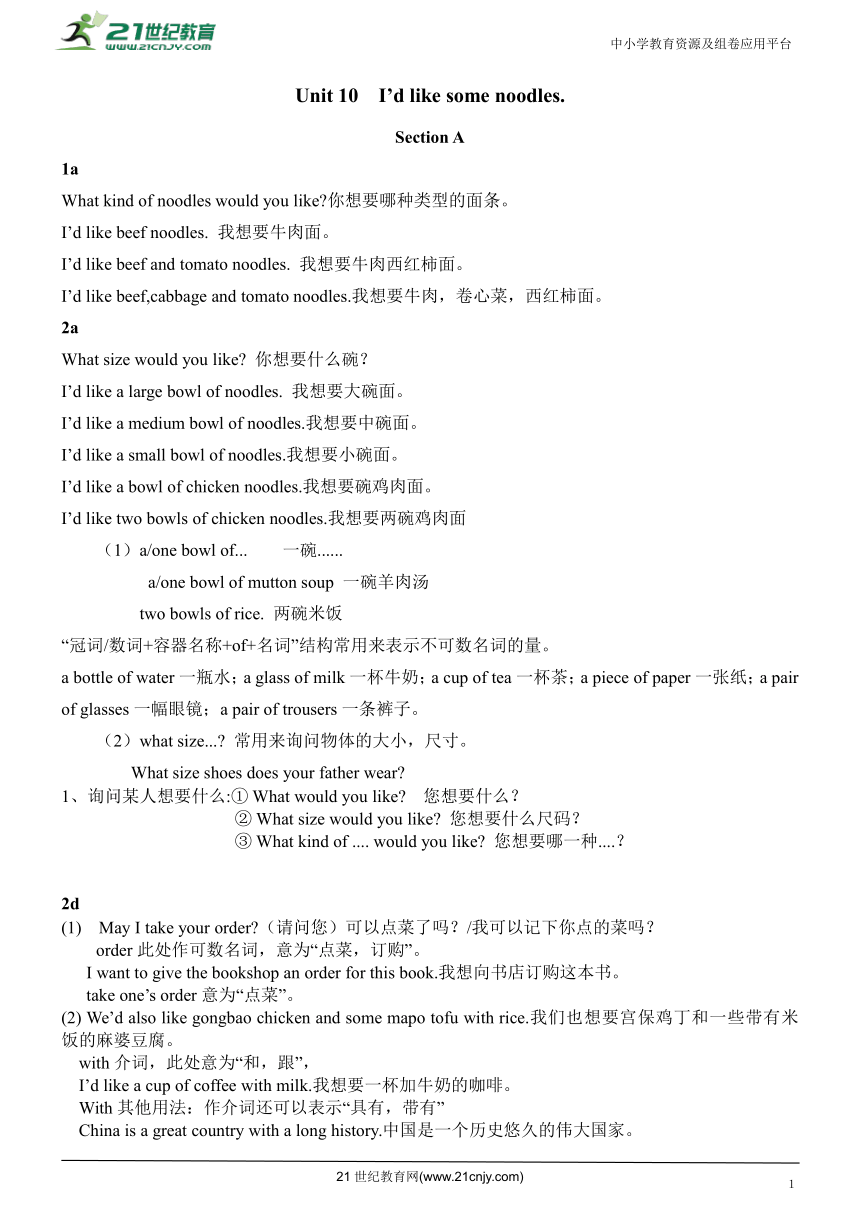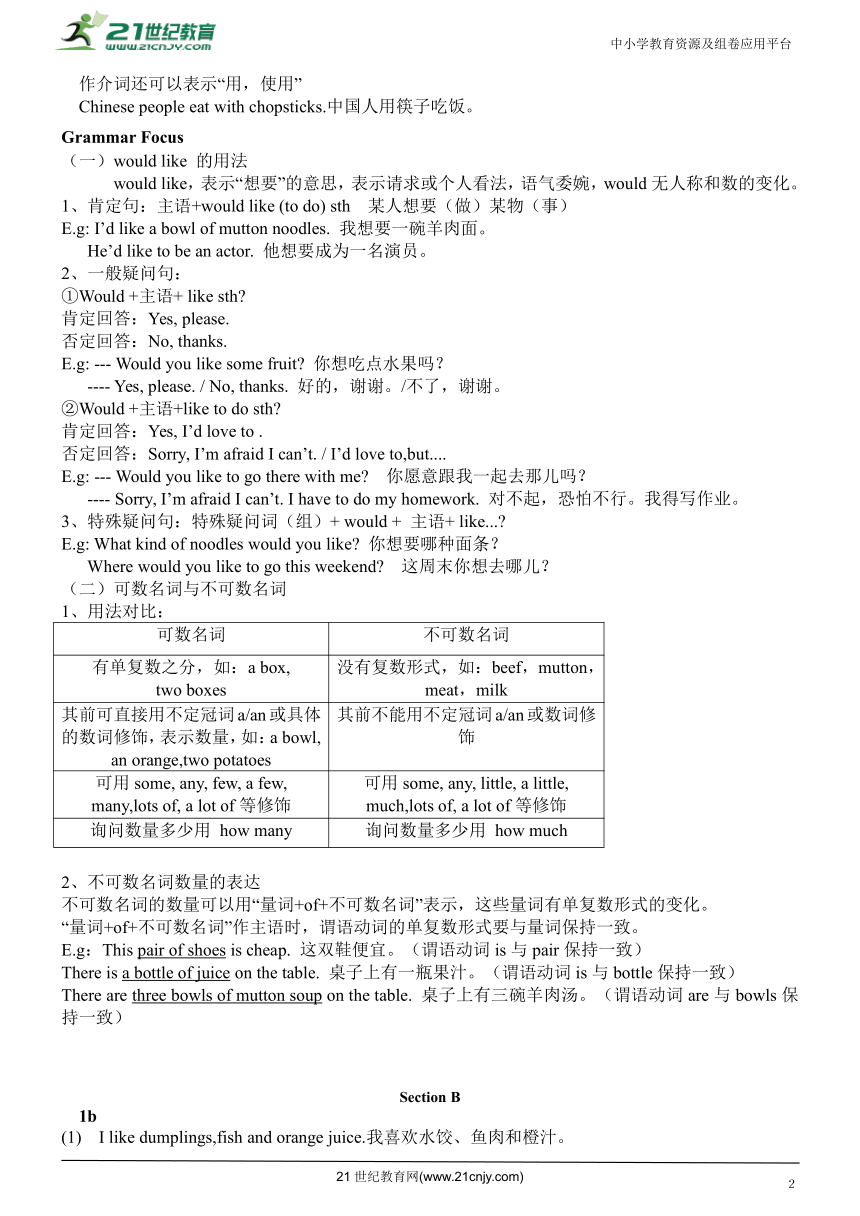Unit 10 I’d like some noodles.知识点总结归纳【人教版七年级下册英语】
文档属性
| 名称 | Unit 10 I’d like some noodles.知识点总结归纳【人教版七年级下册英语】 |  | |
| 格式 | docx | ||
| 文件大小 | 52.8KB | ||
| 资源类型 | 试卷 | ||
| 版本资源 | 人教新目标(Go for it)版 | ||
| 科目 | 英语 | ||
| 更新时间 | 2024-04-10 14:28:22 | ||
图片预览


文档简介
中小学教育资源及组卷应用平台
Unit 10 I’d like some noodles.
Section A
1a
What kind of noodles would you like 你想要哪种类型的面条。
I’d like beef noodles. 我想要牛肉面。
I’d like beef and tomato noodles. 我想要牛肉西红柿面。
I’d like beef,cabbage and tomato noodles.我想要牛肉,卷心菜,西红柿面。
2a
What size would you like 你想要什么碗?
I’d like a large bowl of noodles. 我想要大碗面。
I’d like a medium bowl of noodles.我想要中碗面。
I’d like a small bowl of noodles.我想要小碗面。
I’d like a bowl of chicken noodles.我想要碗鸡肉面。
I’d like two bowls of chicken noodles.我想要两碗鸡肉面
a/one bowl of... 一碗......
a/one bowl of mutton soup 一碗羊肉汤
two bowls of rice. 两碗米饭
“冠词/数词+容器名称+of+名词”结构常用来表示不可数名词的量。
a bottle of water一瓶水;a glass of milk一杯牛奶;a cup of tea一杯茶;a piece of paper一张纸;a pair of glasses一幅眼镜;a pair of trousers一条裤子。
what size... 常用来询问物体的大小,尺寸。
What size shoes does your father wear
1、询问某人想要什么:① What would you like 您想要什么?
② What size would you like 您想要什么尺码?
③ What kind of .... would you like 您想要哪一种....?
2d
May I take your order (请问您)可以点菜了吗?/我可以记下你点的菜吗?
order此处作可数名词,意为“点菜,订购”。
I want to give the bookshop an order for this book.我想向书店订购这本书。
take one’s order意为“点菜”。
(2) We’d also like gongbao chicken and some mapo tofu with rice.我们也想要宫保鸡丁和一些带有米饭的麻婆豆腐。
with介词,此处意为“和,跟”,
I’d like a cup of coffee with milk.我想要一杯加牛奶的咖啡。
With其他用法:作介词还可以表示“具有,带有”
China is a great country with a long history.中国是一个历史悠久的伟大国家。
作介词还可以表示“用,使用”
Chinese people eat with chopsticks.中国人用筷子吃饭。
Grammar Focus
would like 的用法
would like,表示“想要”的意思,表示请求或个人看法,语气委婉,would无人称和数的变化。
肯定句:主语+would like (to do) sth 某人想要(做)某物(事)
E.g: I’d like a bowl of mutton noodles. 我想要一碗羊肉面。
He’d like to be an actor. 他想要成为一名演员。
一般疑问句:
①Would +主语+ like sth
肯定回答:Yes, please.
否定回答:No, thanks.
E.g: --- Would you like some fruit 你想吃点水果吗?
---- Yes, please. / No, thanks. 好的,谢谢。/不了,谢谢。
②Would +主语+like to do sth
肯定回答:Yes, I’d love to .
否定回答:Sorry, I’m afraid I can’t. / I’d love to,but....
E.g: --- Would you like to go there with me 你愿意跟我一起去那儿吗?
---- Sorry, I’m afraid I can’t. I have to do my homework. 对不起,恐怕不行。我得写作业。
特殊疑问句:特殊疑问词(组)+ would + 主语+ like...
E.g: What kind of noodles would you like 你想要哪种面条?
Where would you like to go this weekend 这周末你想去哪儿?
可数名词与不可数名词
1、用法对比:
可数名词 不可数名词
有单复数之分,如:a box, two boxes 没有复数形式,如:beef,mutton,meat,milk
其前可直接用不定冠词a/an或具体的数词修饰,表示数量,如:a bowl, an orange,two potatoes 其前不能用不定冠词a/an或数词修饰
可用some, any, few, a few, many,lots of, a lot of等修饰 可用some, any, little, a little, much,lots of, a lot of等修饰
询问数量多少用 how many 询问数量多少用 how much
2、不可数名词数量的表达
不可数名词的数量可以用“量词+of+不可数名词”表示,这些量词有单复数形式的变化。
“量词+of+不可数名词”作主语时,谓语动词的单复数形式要与量词保持一致。
E.g:This pair of shoes is cheap. 这双鞋便宜。(谓语动词is与pair保持一致)
There is a bottle of juice on the table. 桌子上有一瓶果汁。(谓语动词is与bottle保持一致)
There are three bowls of mutton soup on the table. 桌子上有三碗羊肉汤。(谓语动词are与bowls保持一致)
Section B
1b
I like dumplings,fish and orange juice.我喜欢水饺、鱼肉和橙汁。
I don’t like onions,green tea or porridge.我不喜欢洋葱、绿茶和粥。
and和or都是并列连词,连接并列成分。一般情况下,and用于肯定句,or用于否定句,
or还可作连词,意为“或者;还是”,可用在选择疑问句中。
—Is your brother tall or short —He is tall.你弟弟个子高还是矮?他个子高。
2b
The answer would be different in different countries.
在不同的国家将会有不同的答案。
①answer此处作名词,意为“答案,回答,答复”,
the answer to…表示“……的答案”。
E.g:What’s the answer to the question 这个问题的答案是什么?
②“be different from”表示“与……不同”,
The number of candles is the person’s age. 蜡烛的数量是这个人的年龄。
the number of…+复数名词,意为“……的数量(目)”,在句中作主语时,谓语动词用单数形式。
The number of the students in our school is over 800.我们学校的学生数量超过了800.
“a number of+复数名词”意为“许多的……,大量的……”,作主语时谓语动词用复数形式。
A number of students of our school are from the countryside.我们学校的许多学生来自农村。
at the age of,意为“在……岁时”。
The birthday person must make a wish and blow out the candles.
过生日的人必须要许愿然后吹灭蜡烛。
Blow out 吹灭, 熄灭 “动词+副词”构成的动词短语,代词放中间,名词可放中间,也可放后面。
blow out the candles. 吹灭蜡烛
blow it out 把它吹灭
(5) If he or she blows out all the candles in one go,the wish will come true.如果他或她一口气把蜡烛全部吹灭的话,许的愿望便会成真。
①if连词,意为“如果”,表条件。本句是含有“if”引导的条件状语从句的主从复合句,【注意】在含有if引导的条件状语从句的主从复合句中,if引导的条件状语从句常用一般现在时表示将来,主句常用一般将来时。(主将从现)
If it rains tomorrow,I will stay at home.如果明天下雨,我将呆在家里。
If you study hard,you’ll catch up with others.如果你努力学习,你会赶上其他人。
② come true 表示愿望,梦想等的“实现”或“成为现实”。例如:
Make a wish, and it can really come true. 许个愿,它一定会实现的。
In China,it is getting popular to have cake on your birthday.
在中国,在生日时吃蛋糕正变得流行。
①popular形容词,意为“受欢迎的;普遍的;流行的”,
be popular with…,意为“受到……的欢迎/喜爱”。
He is popular with the young people. 他受到年轻人的喜爱。
② It is +getting+adj+to do sth 做某事正变得......
It is getting easy to study abroad. 去国外学习正变得容易了。
They never cut up the noodles because the long noodles are a symbol of long life.
他们从来不切断面条因为长面条是长寿的象征。
①cut up意为“切断;切碎”。“动词+副词”构成的动词短语,代词放中间,名词可放中间,也可放后面。
cut up the vegetables. 把蔬菜切碎
cut it up 切碎它
②a symbol of意思是“……的象征”。
作文
Xinyue Fast Food Restaurant
Welcome to Xinyue Fast Restaurant. Would you like some soup We have beef and carrot soup for only six yuan a medium bowl. We have mutton and tomato soup for seven yuan a medium bowl. Our cabbage meat noodles are eight yuan a large bowl. You can try our dumplings. They’re ten yuan for twenty. The tomato and egg rice is really delicious.
假如你是李华,请你用英语为他的“幸福面馆”写一则广告
幸福面馆
种类 各类百条(西红柿鸡蛋面、牛肉面、羊肉面)
特色面食 牛肉面
价格 牛肉面大碗18元,中碗15元,小碗12元
要求:1)短文须包括表格中所有提示内容,可适当发挥;
2)词数60左右,开头已给出,不计人总词数。
Hello, everyone. Welcome to Happy Noodle Restaurant. We have different kinds of noodles, like tomato and egg noodles, beef noodles and mutton noodles. Beef noodles are our special. A large bowl of beef noodles is 18 yuan, a medium bowl is 15 yuan and a small bowl is 12 yuan, Just come and taste our noodles, and I think you will like them.
21世纪教育网(www.21cnjy.com)
Unit 10 I’d like some noodles.
Section A
1a
What kind of noodles would you like 你想要哪种类型的面条。
I’d like beef noodles. 我想要牛肉面。
I’d like beef and tomato noodles. 我想要牛肉西红柿面。
I’d like beef,cabbage and tomato noodles.我想要牛肉,卷心菜,西红柿面。
2a
What size would you like 你想要什么碗?
I’d like a large bowl of noodles. 我想要大碗面。
I’d like a medium bowl of noodles.我想要中碗面。
I’d like a small bowl of noodles.我想要小碗面。
I’d like a bowl of chicken noodles.我想要碗鸡肉面。
I’d like two bowls of chicken noodles.我想要两碗鸡肉面
a/one bowl of... 一碗......
a/one bowl of mutton soup 一碗羊肉汤
two bowls of rice. 两碗米饭
“冠词/数词+容器名称+of+名词”结构常用来表示不可数名词的量。
a bottle of water一瓶水;a glass of milk一杯牛奶;a cup of tea一杯茶;a piece of paper一张纸;a pair of glasses一幅眼镜;a pair of trousers一条裤子。
what size... 常用来询问物体的大小,尺寸。
What size shoes does your father wear
1、询问某人想要什么:① What would you like 您想要什么?
② What size would you like 您想要什么尺码?
③ What kind of .... would you like 您想要哪一种....?
2d
May I take your order (请问您)可以点菜了吗?/我可以记下你点的菜吗?
order此处作可数名词,意为“点菜,订购”。
I want to give the bookshop an order for this book.我想向书店订购这本书。
take one’s order意为“点菜”。
(2) We’d also like gongbao chicken and some mapo tofu with rice.我们也想要宫保鸡丁和一些带有米饭的麻婆豆腐。
with介词,此处意为“和,跟”,
I’d like a cup of coffee with milk.我想要一杯加牛奶的咖啡。
With其他用法:作介词还可以表示“具有,带有”
China is a great country with a long history.中国是一个历史悠久的伟大国家。
作介词还可以表示“用,使用”
Chinese people eat with chopsticks.中国人用筷子吃饭。
Grammar Focus
would like 的用法
would like,表示“想要”的意思,表示请求或个人看法,语气委婉,would无人称和数的变化。
肯定句:主语+would like (to do) sth 某人想要(做)某物(事)
E.g: I’d like a bowl of mutton noodles. 我想要一碗羊肉面。
He’d like to be an actor. 他想要成为一名演员。
一般疑问句:
①Would +主语+ like sth
肯定回答:Yes, please.
否定回答:No, thanks.
E.g: --- Would you like some fruit 你想吃点水果吗?
---- Yes, please. / No, thanks. 好的,谢谢。/不了,谢谢。
②Would +主语+like to do sth
肯定回答:Yes, I’d love to .
否定回答:Sorry, I’m afraid I can’t. / I’d love to,but....
E.g: --- Would you like to go there with me 你愿意跟我一起去那儿吗?
---- Sorry, I’m afraid I can’t. I have to do my homework. 对不起,恐怕不行。我得写作业。
特殊疑问句:特殊疑问词(组)+ would + 主语+ like...
E.g: What kind of noodles would you like 你想要哪种面条?
Where would you like to go this weekend 这周末你想去哪儿?
可数名词与不可数名词
1、用法对比:
可数名词 不可数名词
有单复数之分,如:a box, two boxes 没有复数形式,如:beef,mutton,meat,milk
其前可直接用不定冠词a/an或具体的数词修饰,表示数量,如:a bowl, an orange,two potatoes 其前不能用不定冠词a/an或数词修饰
可用some, any, few, a few, many,lots of, a lot of等修饰 可用some, any, little, a little, much,lots of, a lot of等修饰
询问数量多少用 how many 询问数量多少用 how much
2、不可数名词数量的表达
不可数名词的数量可以用“量词+of+不可数名词”表示,这些量词有单复数形式的变化。
“量词+of+不可数名词”作主语时,谓语动词的单复数形式要与量词保持一致。
E.g:This pair of shoes is cheap. 这双鞋便宜。(谓语动词is与pair保持一致)
There is a bottle of juice on the table. 桌子上有一瓶果汁。(谓语动词is与bottle保持一致)
There are three bowls of mutton soup on the table. 桌子上有三碗羊肉汤。(谓语动词are与bowls保持一致)
Section B
1b
I like dumplings,fish and orange juice.我喜欢水饺、鱼肉和橙汁。
I don’t like onions,green tea or porridge.我不喜欢洋葱、绿茶和粥。
and和or都是并列连词,连接并列成分。一般情况下,and用于肯定句,or用于否定句,
or还可作连词,意为“或者;还是”,可用在选择疑问句中。
—Is your brother tall or short —He is tall.你弟弟个子高还是矮?他个子高。
2b
The answer would be different in different countries.
在不同的国家将会有不同的答案。
①answer此处作名词,意为“答案,回答,答复”,
the answer to…表示“……的答案”。
E.g:What’s the answer to the question 这个问题的答案是什么?
②“be different from”表示“与……不同”,
The number of candles is the person’s age. 蜡烛的数量是这个人的年龄。
the number of…+复数名词,意为“……的数量(目)”,在句中作主语时,谓语动词用单数形式。
The number of the students in our school is over 800.我们学校的学生数量超过了800.
“a number of+复数名词”意为“许多的……,大量的……”,作主语时谓语动词用复数形式。
A number of students of our school are from the countryside.我们学校的许多学生来自农村。
at the age of,意为“在……岁时”。
The birthday person must make a wish and blow out the candles.
过生日的人必须要许愿然后吹灭蜡烛。
Blow out 吹灭, 熄灭 “动词+副词”构成的动词短语,代词放中间,名词可放中间,也可放后面。
blow out the candles. 吹灭蜡烛
blow it out 把它吹灭
(5) If he or she blows out all the candles in one go,the wish will come true.如果他或她一口气把蜡烛全部吹灭的话,许的愿望便会成真。
①if连词,意为“如果”,表条件。本句是含有“if”引导的条件状语从句的主从复合句,【注意】在含有if引导的条件状语从句的主从复合句中,if引导的条件状语从句常用一般现在时表示将来,主句常用一般将来时。(主将从现)
If it rains tomorrow,I will stay at home.如果明天下雨,我将呆在家里。
If you study hard,you’ll catch up with others.如果你努力学习,你会赶上其他人。
② come true 表示愿望,梦想等的“实现”或“成为现实”。例如:
Make a wish, and it can really come true. 许个愿,它一定会实现的。
In China,it is getting popular to have cake on your birthday.
在中国,在生日时吃蛋糕正变得流行。
①popular形容词,意为“受欢迎的;普遍的;流行的”,
be popular with…,意为“受到……的欢迎/喜爱”。
He is popular with the young people. 他受到年轻人的喜爱。
② It is +getting+adj+to do sth 做某事正变得......
It is getting easy to study abroad. 去国外学习正变得容易了。
They never cut up the noodles because the long noodles are a symbol of long life.
他们从来不切断面条因为长面条是长寿的象征。
①cut up意为“切断;切碎”。“动词+副词”构成的动词短语,代词放中间,名词可放中间,也可放后面。
cut up the vegetables. 把蔬菜切碎
cut it up 切碎它
②a symbol of意思是“……的象征”。
作文
Xinyue Fast Food Restaurant
Welcome to Xinyue Fast Restaurant. Would you like some soup We have beef and carrot soup for only six yuan a medium bowl. We have mutton and tomato soup for seven yuan a medium bowl. Our cabbage meat noodles are eight yuan a large bowl. You can try our dumplings. They’re ten yuan for twenty. The tomato and egg rice is really delicious.
假如你是李华,请你用英语为他的“幸福面馆”写一则广告
幸福面馆
种类 各类百条(西红柿鸡蛋面、牛肉面、羊肉面)
特色面食 牛肉面
价格 牛肉面大碗18元,中碗15元,小碗12元
要求:1)短文须包括表格中所有提示内容,可适当发挥;
2)词数60左右,开头已给出,不计人总词数。
Hello, everyone. Welcome to Happy Noodle Restaurant. We have different kinds of noodles, like tomato and egg noodles, beef noodles and mutton noodles. Beef noodles are our special. A large bowl of beef noodles is 18 yuan, a medium bowl is 15 yuan and a small bowl is 12 yuan, Just come and taste our noodles, and I think you will like them.
21世纪教育网(www.21cnjy.com)
同课章节目录
- Unit 1 Can you play the guitar?
- Section A
- Section B
- Unit 2 What time do you go to school?
- Section A
- Section B
- Unit 3 How do you get to school?
- Section A
- Section B
- Unit 4 Don't eat in class.
- Section A
- Section B
- Unit 5 Why do you like pandas?
- Section A
- Section B
- Unit 6 I'm watching TV.
- Section A
- Section B
- Review of Units 1-6
- Unit 7 It's raining!
- Section A
- Section B
- Unit 8 Is there a post office near here?
- Section A
- Section B
- Unit 9 What does he look like?
- Section A
- Section B
- Unit 10 I'd like some noodles.
- Section A
- Section B
- Unit 11 How was your school trip?
- Section A
- Section B
- Unit 12 What did you do last weekend?
- Section A
- Section B
